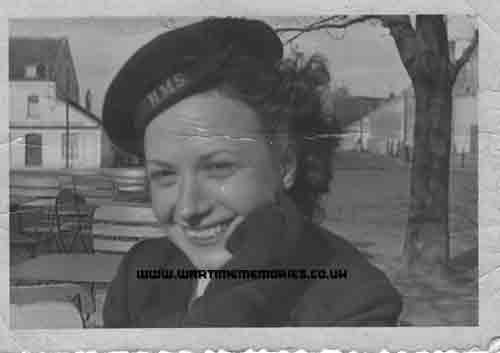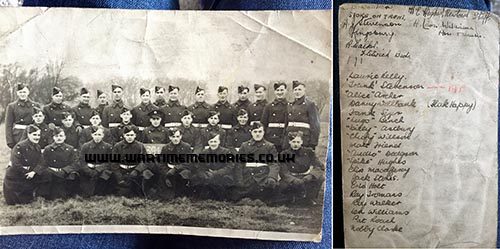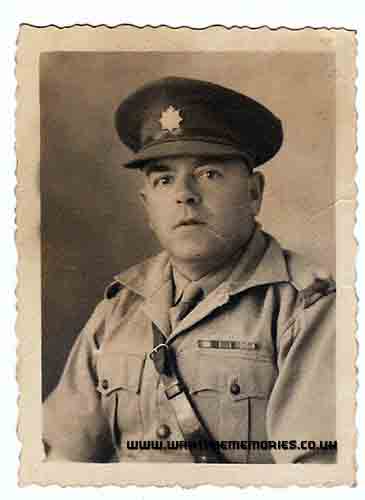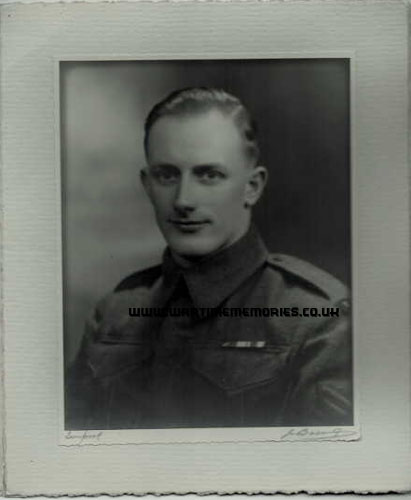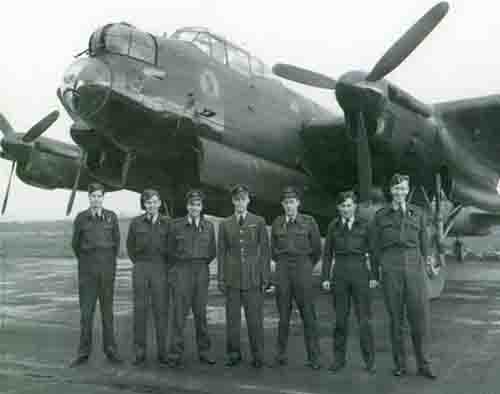Annie "Nan" McAteer . Womens Royal Naval Service S.H.A.E.F. from Motherwell Nan's War
(Written for her granddaughter Tanith and used by her other granddaughter Fiona for her school work.)
When I had to register for service I chose the WRNS.
One day two policemen called to see me in this connection and asked me all sorts of questions, particularly: my education from infant school till leaving, and my commercial and secretarial course, where I worked, what type of job, etc., followed by questions on every member of the family.
Shortly afterwards I received my calling-up papers, but my boss got me deferred twice. The third time this was refused and so I was on my way to Mill Hill (London). I hadn't been anywhere outside Scotland.
At Mill Hill our party were issued with uniforms and were given numerous injections and medical examinations. We were told we had three weeks in which to decide if we wanted to stay in the WRNS. The alternative, of course, was the WRAC or the WRAF etc.
I decided I wanted to be a teleprinter operator (never had been one) and 18 of us opted for the same. We had about an hour to get accustomed to one of these and then came the test. The instructor said there are 18 of you here and only 6 are going through and I can tell you before the test starts who the 6 are going to be chosen. The girl I was most friendly with didn't make the grade and this was sad. However, as in all groups, friendships were easily made and so life in the WRNS started in earnest.
Bombs were of course dropping around us and barely a night passed without us being woken up and marched underground to shelter.
After about 6 weeks we were sent to Westcliff and billeted in a large hotel on the sea front, this was mid-winter and one had such an eerie feeling with the darkness and the swish of the sea. We went each day for training at a beautiful cottage which belonged to that most famous of actors Conrad Veight. We learned different code signs for calling stations (on the T/P), to give receipts for incoming signals and of course to master the T/P. When this course was finished we were put on our underground train (the tube) and an unknown track took us right into the Admiralty. Here we learned the T/P switchboard using the call signs we had been taught previously.
After a week we were all sent out to individual naval stations (alone), presumably to prove our capabilities. 3-4 weeks later a draft notice appeared and I wasn,t on it. Having worked to near exhaustion through the night I tumbled into bed after breakfast. I had hardly been asleep, no more than an hour when two officers woke me and said I should have been on the draft list. They packed my things and took me off in a car to the station, instructing me to get to Fareham (Portsmouth). I got as far as Eastleigh to make a connection but spent the night on the platform with numerous other service personnel. It was about 3am when a train finally arrived and when I reached Portsmouth I reported to the RTO as instructed who arranged a car and driver to take me to my intended destination (not known to me). Here again the officers made up a bed (had to sleep between blankets) and gave me cocoa and chocolate biscuits, quite a treat! On waking up in the morning the excitement was overwhelming when all my friends I'd been parted from were all there.
This proved to be the S.H.A.E.F. (Supreme Headquarters Allied Expeditionary Force) at Southwick House. We worked in a large mansion (underground) which housed the signal centre, plotting rooms, etc and above was Gen. Eisenhower, Montgomery, Leigh Mallory (RAF) and Admiral Ramsay.
Work was still hectic but we did have dancing in the camp and could go outside to shop etc. We had to have a pass. For several weeks we were all confined to barracks ie Army, Navy, Air Force, Royal Marines, etc. However the WRNS were privileged to be taken to the Plotting Room and were shown the position of the ships at sea and the battles currently taking place with German vessels.
During this time while the signals were being sent out and received we hadn't a moment to ourselves when suddenly the machines (T/Ps) all stopped ie nothing being sent out or received so we all frolicked about when someone from above enquired several times if a signal had come through. Eventually it was waiting on the machine for a receipt and sent up on the conveyor belt. The signal was in code but it was the weather forecast which decided D-Day 6th June.
I mustn't forget to mention that the V1 (flying bombs) flew over night after night. These were horrendous things, you first stood paralysed waiting for their engines to stop for when they did, down they came. At first anti-aircraft guns tried to bring them down (which lit up the coastal region together with the searchlights) but later they were allowed to go on their way, wherever!
Three months after D-Day, ie 6th September, we were all on our way to France. I think it was the Ulster Monarch we sailed on and, horror of horrors, we had a magnetic mine following us for an hour. Fortunately, the captain etc. managed to lose it.
We transferred on to a landing craft at sea and then were put off at the Normandy Beach. We (all forces) travelled in 10 ton trucks in convoy and eventually arrived in a small fishing village called Granville (it was deserted).
We met up here with the Americans. The T/Ps were better (more like typewriters) and for the first time we enjoyed white bread, being on American rations, no more spam!
We moved on from here as parts of France were being liberated. First stop was St. Germaine. I remember Admiral Ramsay shook hands with us all, I think it was Xmas. Soon after he died, what a lovely man he was.
Next stop was St. Cloud where the Germans had their camps and destroyed everything. We were quite near Paris and a few times managed to see a bit of it. The women rode cycles wearing hats which I found amusing. We saw the Palace of Versailles and on one occasion went to the Follies Bergere. Saw also Notre Dame but this didn't mean much as all the windows had been stored somewhere.
Now we're in convoy again on the way to Brussels only to be greeted with V2s this time. We were billeted in Waterloo and travelled to the signal centre in Brussels to work.
Whilst there a German plane was brought down and landed 100 feet from the signal centre. We all dived under the T/Ps, old army ones again (on spring loaded legs) which was stupid as they must have weighed a few hundredweight and we could have been injured had they collapsed. The explosion rocked the signal centre.
Up to this time we never had any leave and because we were all exhausted, the M.O. insisted we have 10 days leave.
The boat was Swedish, called the Suacia. It was luxury personified and we were all sorry to disembark. Anyway it was good to be home.
Returning to Brussels on one of the Empire or was it the Empress ships can't remember, we were soon on our way again. This time we flew in a Dakota to Hamburg in Germany. We worked in Bad Oeynhausen and sometime later had 72 hours leave in the Hartz mountains. Some Germans were friendly but others would spit on the pavement as British would pass them.
From Hamburg we were sent to Minden (still Germany). I remember we went through Essen which was completely demolished by the RAF.
This was my last posting on the continent, the war truly over.
By this time all of us felt the urge to get home and later sailed to Chatham for demobilisation.
Annie (Nan) MacKenzie, nee McAteer.
| 

